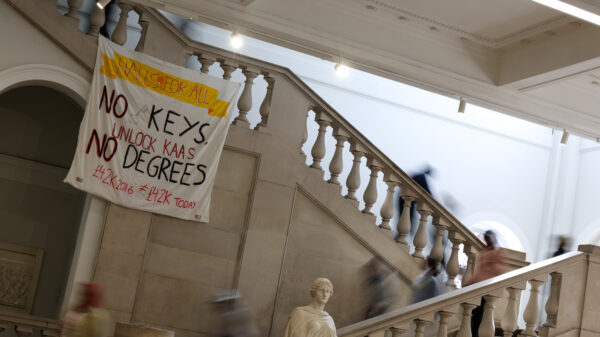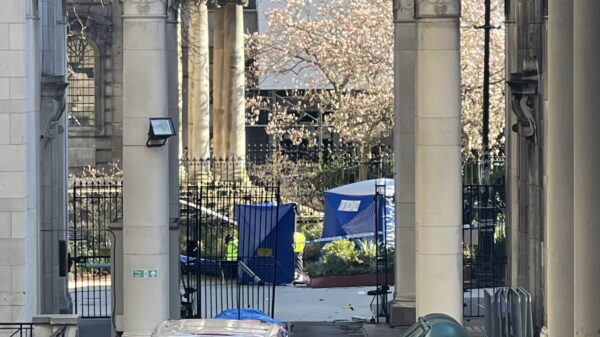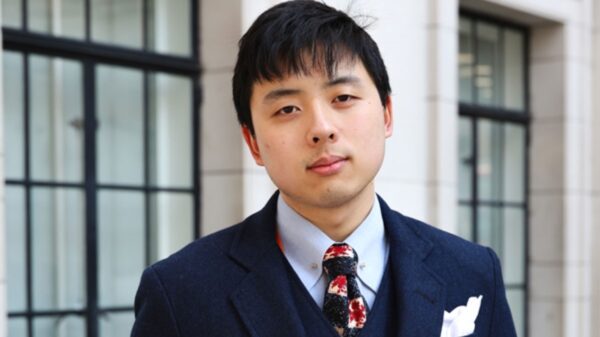On Wednesday 19 May, KCL UCU (King’s College London University & College Union) passed a motion of no-confidence in the Chairman of the Council of King’s College London, Lord Christopher Geidt, following discovery of his work as an advisor for the arms company BAE Systems. The union also passed a motion in solidarity with the Palestinian people and against the ethnic cleansing of Palestinians from East Jerusalem.

Official portrait of Lord Geidt, new ethics advisor on UK ministers’ interests
Lord Geidt’s appointment as the government’s new ethics advisor – tasked with clearing up the current administration’s sleaze scandal – has shone a spotlight on his work outside of public office and, as openDemocracy has uncovered, his work on the international advisory board of BAE Systems.
This news prompted outrage from KCL students and staff, with academics from the university calling for his “immediate resignation†from KCL. This prompted KCL UCU’s recent discussion centring around Lord Geidt’s position at the university.
KCL’s link to war crimes
Union members expressed their intention to ensure their commitment to the group’s new mission statement, issued after the 2020 Black Lives Matter protests. Its goals of “fighting racism and racial inequality” were understood to be central to their objective of “serving society and making the world a better place”.
Within this remit, KCL UCU discussed the ethnic cleansing of the Palestinian people, the “crimes against humanity of Apartheid and persecution” committed by the Israeli government, and Lord Geidt’s link to this and other war crimes through his work with BAE Systems.
KCL is also alleged to have invested over £5 million in companies which directly or indirectly fund the Israeli government. The KCL UCU acknowledges and attributes the systemic discrimination of the Palestinians and ethnic cleansing to “Israel’s settler-colonial and supremacists nature, for which Britain bears special responsibility”.
Corruption, bribery and war crimes
BAE Systems has long faced allegations of bribery and corruption, with some of the most shocking being their selling of £15 billion worth of arms and services to Saudi Arabia during their onslaught in Yemen from 2015-2020.
In 2019, the International Criminal Court accused them of aiding and abetting war crimes and human rights violations after hospitals, schools and civilians were targeted. BAE weapons have also been involved in the continuous Siege of Gaza and perpetrating human rights violations against the Palestinian people by the Israeli government.
They are one of the government’s largest contractors, having won billions worth of deals from various ministerial departments since Boris Johnson’s election as Prime Minister.
Lord Geidt stepped down from his role at BAE Systems on 8 April, prior to receiving the formal offer to work as the government’s ethics advisor on 14 April. He cited needing to lighten his work load as the reason.
Geidt’s grilling by MPs
During the Public Administration and Constitutional Affairs Committee on Thursday 13 May, more attention was brought to Lord Geidt’s work with BAE Systems. Many MPs voiced their concerns about his ability to act impartially as Johnson’s ethics advisor in light of his past and potential future conflicts of interest.
Labour’s former shadow chancellor John McDonnell asked: “How can anyone have confidence in you enforcing ethical behaviour when you’ve been associated with an unethical arms dealer that’s willing to sell to any murderous, brutal dictatorship and use corruption to secure those sales?”
Lord Geidt responded by saying that he is “proud” to have worked for the arms company as it aligned with his interests and previous experience.
Ethics and arms?
According to the UCU, Lord Geidt’s actions have highlighted structural issues with regards to KCL. The union has demanded (1) his immediate resignation as Chairman of the Council, (2) a democratised KCL Council – currently, 15 out of the 19 council members are appointed by existing members with no accountability – and (3) for the College to publish the outcomes of its 2017 committee on disinvestment from arms companies, making all current links public and drawing up plans to end them promptly.
The Congress concluded that they will also urge members to review relationships with Israeli institutions and their moral implications, to call on the British Government to impose trade sanctions and arms embargoes on Israel as an Apartheid state, and to use their resources to aid in the circulation of petitions and other materials to support the Palestinians and legitimately criticise Israel and Zionism.
KCL UCU has given Lord Geidt 28 days to respond. They state that they are “completely committed to working constructively with the whole Council to restore mutual trust and confidence, and open to talk about every possible alternative”.
The university responded on Wednesday claiming that all investments are in line with policy, procedures and KCL values, and that they do not hold investment in “controversial weapons” – this assuming that F-16s made with BAE parts are not controversial.
Last year, KCL UCU stated their intention to make substantial structural change in eradicating inequality and the institutional mechanisms which perpetuate racism and state violence. Halting any and all collaboration with oppressive regimes, such as that of Saudi Arabia and Israel, has been one of their first considerable tests in doing so since the 2020 protests. Though not yet achieved, KCL UCU still remains hopeful that the university will disinvest from all arms companies and follow the example of other institutions, such as the University of Manchester, which have already done so.
History BA student. Writer. Photographer. Coffee aficionado.













